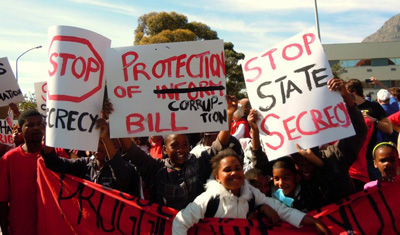New York, September 20, 2011–The Committee to Protect Journalists is relieved by Monday’s decision by the parliamentary majority of South Africa’s ruling party to withdraw a controversial bill from consideration pending further consultation with public interest groups over its contentious clauses.
The move by the African National Congress (ANC) followed a series of public protests since Saturday by critics of the Protection of Information Bill, according to news reports. The ANC has touted the proposed legislation as a necessary tool against espionage, while critics have called it the “secrecy bill” because its repressive clauses criminalize investigative journalism and allow officials to classify any information in the name of “national interest,” CPJ research shows. The bill also proposes prison sentences of three to 25 years for anyone who discloses classified information on public interest grounds, with no exemption for journalists.
On Monday, the ANC caucus released a press statement saying that “further consultations and debates should therefore continue on the bill with a view to further enhance the quality of the current draft” and called for further consultations with interest groups “and engaging views from the broader society.”
“We welcome the decision by South Africa’s ruling African National Congress to extend consultations with public interest groups on this legislation that could destroy investigative journalism in the country,” said CPJ Africa Advocacy Coordinator Mohamed Keita. “The ANC, which fought against the secrecy and censorship of the apartheid government, cannot turn around now and use legislation to silence a challenging press.”
The decision came a day before the National Assembly was scheduled to start final consideration of the bill, news reports said. Hundreds of South Africans had organized protests against the bill over the weekend, including a march outside parliament in Cape Town and candlelit vigils in Johannesburg and Durban, according to news reports.
South Africa is on the steering committee of the newly formed international Open Government Partnership and has pledged to, among other things, “strengthen corruption-combating instruments,” “strengthen mechanisms for meaningful citizen engagement in … policy development processes,” and “hold public servants accountable to the public and the communities.”
